
Speculative Pagan
I read just about anything so long as it's good!

Breaking the code, finding the goddess

I did not really expect to be convinced by Jerri Studebaker’s book about finding signs of ancient Goddess worship in fairy tales. I’m just not the sort of person who is easily persuaded by much, and the sleight of hand history of Dr Anne Ross, and the chicanery of Robert Graves have left me resistant, to say the least. I’m very wary of circular logic, too. Go out looking for evidence of sacrifice and you’ll see it any time there’s a dead person. Go out looking for Goddess survivals and you can all too easily infer them into anything with breasts.
I ended up persuaded to a degree that surprised me.
What makes this book such an interesting and provocative read isn’t, I thought, the main thrust at all. It’s the details. The histories of where nursery stories have come from and how they’ve changed over time. The correlations between fairy stories and other major cultural shifts. I’d not thought before about the way in which many fairy stories are really at odds with Christian stories. I was, I confess, too busy being cross about the princesses. But now I have reasons to rethink those, as well.
The historical correlations Jeri Studebaker brings together in her book are intriguing. There are many unanswered mysteries here, that will leave you wondering. She has evidence for the political use of the fairy story as a way of making commentary, and the literary place for the fairy tale in Europe as well. That’s without getting into the issues of goose footed women, egg laying, and shamanism. Oh, and magic spells. And how we might envisage a non-patriarchal world. I love this book because the author is cautious about her claims, and keen to remind us when she is speculating and the limits of what the evidence can support. Speculation is so much more enjoyable when we hold our uncertainties with such honour, I think.
At this point, whether or not Mother Goose is really, historically and provably a goddess survival seems a lot less important than what we try to do with her stories, and other such stories, moving forward. It is in the nature of stories to change and evolve over time, being re-imagined to fit the new context. Stories that survive are often stories that can be adapted, or that give us powerful archetypes to work with. So the question to ask may really be, how do we want to work with those archetypes in the first place? What stories do we want to tell, and why? Do we understand the implications of the stories we are sharing?
For me, the book raised another question as well. (Bear in mind here that I am a maybeist, not a theist nor an atheist.) If religion is imagined into existence by people, as well it might be, then to connect with the religions of our ancestors we need their stories, or whatever fragments survive. Take away its stories and Christianity ceases to exist. If religion is based on the experience of living, then through shared experiences, we can come to similar conclusions as our ancestors did. If we reverence the things life depends on, then we can find our way to the importance of the mother, the goose, the eggs and all the other ideas about life fairy tales can carry. If the deities are independently real and active, then of course things that look like them will keep turning up in people’s stories and ideas, for all the same reasons that they turned up in the first place – because they are offered to us by the divine as inspiration.
I don’t know. I still don’t know. I’m fine with this, and I enjoy books like this one that are able to challenge my carefully chosen uncertainty.
More about the book here – http://www.moon-books.net/books/breaking-mother-goose-code
Blog first posted at https://druidlife.wordpress.com/2015/03/14/breaking-the-mother-goose-code/

Literature and Landscape
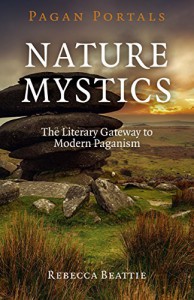
One of the perks of my day job is that I frequently get to read books before they come out. As my current study program is all about landscape, walking and the relationship between people and place, I jumped on Rebecca Beattie’s ‘Nature Mystics’. It’s a small book, and opened up new lines of thought for me. Nature Mystics explores a very specific time frame – the transition from 19th to twentieth centuries, looking at the relationship between fiction and the context from which 20th century Paganism grew.
Paganism is a very book orientated religious path. While we don’t have definitive religious books in the style of many other religions, we do have a lot of books. It may be that the absence of core texts has created both the need and the room to create this ever growing body of writing. However, the odds of a person coming to Paganism because they’ve picked up an overtly Pagan book are perhaps not so big. Thinking back, my personal path probably began with Alan Garner’s ‘The Owl Service’ and I’ve met a few people who came to Paganism through ‘The Way of Wyrd’. Tolkien’s books create a certain kind of longing. Or perhaps for some it was Kipling’s poems of history and mystery. Gettafix from the Asterix comics may have been the first Druid some of us encountered. Fiction has the capacity to get in under our radar, and show us things we weren’t looking for.
For me, Rebecca’s book raised a number of thoughts. How is the land portrayed in fiction? Anything that happens does so in a time and a place, in a season, a climate but these things aren’t always present in books and to include such details is to risk people treating them as symbols for the inner lives of characters, and not, simply, what the weather was doing.
Reading Rebecca’s book it became clear to me that the author’s personal relationship with the natural world is a key part of how they write. For many authors, nature is just backdrop for the human events being portrayed. An author who is sensitive to landscape and the natural world will write from a place of emotional engagement, and that in turn has the power to help others connect and be inspired. Finding those emotional connections with nature can be the first move towards conscious Paganism.
Nature Mystics sits well alongside Robert McFarlane’s Landmarks, which explores less fictionalised writing of the land. I find it especially valuable because of the invitation to step back and look at a whole host of bigger pictures. Paganism in the context of the fiction that went before it. Literature in the context of lives lived. Stories in the context of landscapes. At the same time, like Robert McFarlane, Rebecca also directs us towards the detail, the way precision in landscape writing creates reality, brings place forward as a character in its own right, grounds stories in something specific. The grand vistas and the intimate details are equally important, in landscape and in writing. They cannot be separated out without losing something important.

The amazons speak
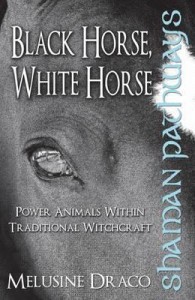
I've collected below some quotes from amazon reviews, attributed as we go...
"'Black Horse, White Horse' condenses into less than 100 pages pretty much every facet of what horses have meant to us over the ages, covering beliefs, traditions, folklore, symbolism, mythology and superstition across many cultures." S.j.
"This is a super little book for anyone who has horses, works with horses or who just loves horses and would like to get to know and understand them better." Yvonne.
"I strongly recommend this book to anyone who feels a call to either the horse in their magical practice or who simply rides and would like more background knowledge of how our ancestors related to this wonderful beast." Mrs Susan Kennedy
Currently averaging on amazon.co.uk at 4.6 stars, if magic and horses are part of what you do, this is definitely a book to check out.

Community Cursing
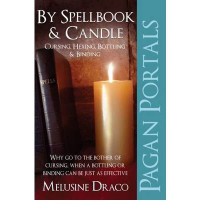
This is a reblog from https://druidlife.wordpress.com/2012/08/18/community-cursing/ where I reviewed this book back in 2012
I’ve just read Melusine Draco’s fascinating book By Spellbook & Candle: Cursing, Hexing, Bottling & Binding. (Recommended). It’s a very interesting piece of work which includes all sorts of information about the history of cursing. The one thing that grabbed me particularly was the idea of community cursing. The general image of cursing is more of the solitary, perhaps shameful act of malevolence against another. It’s done alone, in darkness, the evidence carefully hidden so you don’t get burned as a witch. A clichéd image, I know, but I think that’s the more normal association.
Community cursing is a whole other thing, and this book flagged up a number of times and places when its known to have been carried out. The best know example would be the Catholic excommunication, the accompanying language for which is tantamount to cursing somebody. And what could be more damning than removing a person from the presence, and care, of god? When a community gathers to publically throw a curse at someone, this has a totally different vibe from the private cursing image. For a start, normally the one who curses would be the one to face punishment in the event of discovery. Communal cursing, especially religion sanctioned, perhaps even undertaken by your priest or some other figure of authority, keeps power with the majority. It begs the question of why you might choose a curse in that scenario rather than more conventional, physical responses to a problem person.
If the intended recipient of a communal curse is an outsider, perhaps they will never know. It makes sense to curse the enemies of the tribe, and sociologically speaking, I suppose that’s as much about group identity and making up for a sense of lost power as anything else. When the majority undertakes to curse the lone individual from inside the community, there have to be other reasons, and I am not sure what they are. Punishment by public humiliation? A method for controlling behaviour, akin to the rough music used in some communities to shame those who do not conform to shared standards? Is it an implicit threat that next time action will be more direct? It probably varies across places and times. In the case of Catholic excommunication and other curse exiles, it is about publically removing the person from the community. For a lot of history, being outside the fold was probably a death sentence.
The whole issue flags up for me how contextual most things are. If someone with power, sanctioned by religion, curses another, that’s not evil, it may even get you saint status. When the curse is the only means of revenge or justice available to someone who is largely powerless, then the discovery of it will likely lead to further disempowerment.
Of course some, if not most of the cursing evidenced by folk practice, was all about greed and malice. Much of it won’t have had any decent justification. Cursing is just another way in which humans have sought to get advantages over each other, score points, and get our own way. It’s neither pretty nor excusable. But then there are the curses of the starving beggar, turned away from the rich house in the depths of winter, empty handed and powerless. I’ve encountered a few witch trial stories that start from just such a point. The wronged one powerless to get justice by conventional means, and invoking poetic justice, the wrath of God or their own anger in a quest to balance the books. And oddly enough, as Melusine points out, when someone poor and powerless curses in this way, and the curse comes to pass, no one seems to consider that this might not be evil at all, but a bit of divine intervention on behalf of the aggrieved one.
It had never before occurred to me that curses could be such a loaded, political issue!

"More and more often these days I get asked what books would I recommend for solitary witches who have gone beyond material aimed at beginners. The truth is, there aren't that many. The Deep Heart of Witchcraft, by David Salisbury, is one I've recommended in the past. Now I'll be adding Traditional Witchcraft and the Path to the Mysteries by Mélusine Draco.
This book is the final in Mélusine's series Traditional Witchcraft for Urban Living, Traditional Witchcraft for the Seashore, Traditional Witchcraft for Fields and Hedgerows,Traditional Witchcraft for the Woods and Forests and Traditional Witchcraft and the Pagan Revival.It is aimed at witches who have worked through all the earlier books, taken on board the lessons and have a thorough grasp of the techniques and practices of witchcraft. So, one might ask, what is there left to learn? "
Taken from http://www.badwitch.co.uk/2015/03/review-traditional-witchcraft-and-path.html this is part of a much longer review of Path to the Mysteries, written by 'bad witch' Lucya Starza.
I've tagged the other books in the series, which Lucya refers to in her review, and also David Salisbury's excellent 'Deep heart of witchcraft'.

Haunted Palace reviews

Haunted Palace is an excellent review site covering a wide range of topics. The review of Traditional Witchcraft and the Pagan Revival is a huge and indepth piece. Here's a small quote for flavour.
"I found this book to be very engaging, enlightening and at times challenging – it covers a great deal of ground in under 200 pages. While there are undoubtably more complex and detailed archaeological and historical studies available and Draco’s interpretation of the evidence whilst drawing on some very distinguished sources, is very much her own, this book provides a good over view of archaeological and historic periods from earliest times to the present day. Her survey outlines the main theories in relation to magical and religious developments within the British Isles and her insight how these traditions and survivals may have influenced Traditional British Witchcraft and Neo-pagan traditions such as Wicca."

A roundup of reviews
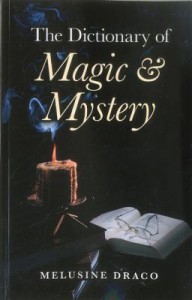
I've collected some quotes from various reviewers, credited as we go...
"This is an excellent book for the beginner, and even those with more experience as it is impossible to know about everything. Recommended." MH. The Cauldron ~ Michael Howard, The Cauldron
"This is a thorough compendium of magical and esoteric information. The author has compiled a veritable treasure trove of knowledge any magical practitioner and seeker after the truth should include in their personal library. You might think this mere hyperbole, it is not. It is a resource, from which we can draw upon for further research, for learning is unending and its practical application is our goal" - Jan Malique, amazon
"I found myself making excited notes on Podomancy, Cramp Rings and the Angel of Death – and already wondering where these different springboards could lead. Within the dictionary format, the work is helpfully constructed into sections, ie; Black Magic, White Magic, while references for further research are relevant and not too copious...I’m convinced this amazing volume will stir the writer’s imagination and help to get their work noticed. Unique and memorable." ~ Sally Spedding, The New Writer
"This is a great source of information brought together in one book. A useful companion for anyone with an intrest in the subject. Clear, strqaight forward, no nonsense and no waffle. A bookshelf essential" - Miss Angela Stasiak, amazon

Meditation for Pagans
When I first came to meditating as a practice, there weren't many books on meditation aimed at Pagan readers. The number has increased since then, and I've been implicated in two of the books (linked to this post). I was delighted when Rachel Patterson announced that she'd written an introduction to meditation - her easy, accessible style is a great counterpoint to what can be seen as a difficult area of spiritual practice.
I felt honoured to be asked if I'd endorse this book. Here is what I've said: "This is a very readable, user-friendly book, giving a taster of a broad range of meditation practices. Pragmatic, highly usable, and with plenty of inspiration and jumping off points, this is a great place to start if you want to explore meditation as a Pagan."
One of the other people to comment on this book ahead of publication is James Nichol, who put together the Contemplative Druidry book I've tagged. Contemplative Druidry was a community project, featuring many voices, one of which was mine. James made the following observation having read Pagan Portals - Meditation.
"Rachel Patterson has written an exuberant and free-spirited introduction to a subject often treated with undue deference and solemnity. She gives her readers permission to sample the smorgasbord of the world's traditions, providing a stimulus to craft their own practice and/or connect with relevant communities and teachers."
The book is available from December 2015 and i can very much recommend it for anyone who is either new to meditation, or struggling with it.
"her instructions are really easy to follow. I must confess, I have always bought smudge sticks from shops but it is so easy to make them, now I know how, that I feel a fool and I'm inspired to try some of these ideas out."
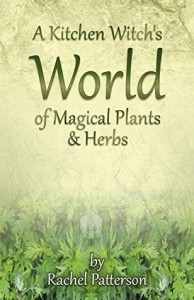
This a comment from a review first posted on http://www.witchhazelsmagick.com/2014/10/book-review-kitchen-witchs-world-of.html - the reviewer is a book lover and a witch, and clearly really got on with the book.

"After reading Rachel Patterson’s newest book in her Kitchen Witch series, you just might be inspired to give your kitchen a magical makeover. Not only is she a veteran author of five books on magical food, she is High Priestess of the Kitchen Witch Coven and an elder at the online Kitchen Witch School of Natural Witchcraft. With touches of cheeky humour, she describes readying the kitchen and cooking equipment for magical work, seasonal and holiday recipes, magical food for intent, correspondences of various sorts, food for the moon cycle, and food spells. Think “Engagement Chicken” (Glamour magazine’s famous recipe for inducing a man to propose) taken to a whole new level!"

Spiral Nature is a fantastic website exploring magic and spirituality. The quote is from there review of A Kitchen Witch's world of Magical Food - you can read the rest here -
http://www.spiralnature.com/reviews/kitchen-witchs-world-magical-food/
And then you can go on and poke around the rest of the site, because it's well worth exploring.

"If you have ever wondered, really wondered about witches, and I don’t mean the kind that fly about on broomsticks, I mean the real ones that live and work in your community, this essential guide will answer all your questions."

Deep time and the wilderness

Most of the wilderness fiction I’ve read is historical. Last of the Mohicans, Moby Dick, Robinson Crusoe, assorted American transcendentalists, – books whose authors who had the advantage of writing about places and environments that were largely unknown, unpredictable and clearly dangerous. While people still go off on adventures, exploring less known places, mobile phones and GPS make that a very different game. The places untouched by humans are far scarcer than they were two hundred years ago. And yet we have this collective attraction to the unknown, the untouched. For the greater part, fiction has replaced the wilderness with fantasy worlds, and the science fiction bid to seek out new life and new civilizations, and boldly split infinitives where no one has split them before.
Anthony Nanson’s “Deep Time” is a real stand out as a piece of modern wilderness writing. It is a speculative novel, but at the same time so rooted in observation and detail, that it is able to create a sense of adventure and mystery right on the edge of human experience. Where fantasy and science fiction can tend towards the escapist, Deep Time brings us back to ourselves, to the land, to the idea of wilderness as something precious that we ought to preserve. It also, by cunning means, encourages us to look at our own time and place with fresh eyes, seeing connections and possibilities we might otherwise have missed. It delivers all of this, and more, in a fast placed action adventure plot that does not let up for some 700 pages.
I’ve head genre fiction defined as ‘everything happens and no one thinks about it’ versus literature as ‘very little happens and everyone thinks about it a great deal.’ It frequently bothers me that modern publishing often defines ‘literary’ as something dull, worthy, tediously real and lacking in pace. Very little happens. Everyone thinks about it a lot. At the same time, more creative plots and unreal settings fall into the low brow pop culture bracket, and are not to be taken seriously. Shakespeare could write about faeries, Dickens could write about ghosts and be taken seriously, but they probably wouldn’t get away with it these days.
I know that it is possible to have books with pace, action, adventure and speculative elements that are also powerful literary pieces. The quality of writing, the kind of depth that can be woven into a plot, the way in which speculation can reflect the world back more meaningfully than representation can. The unfamiliar requires us to think, to test assumptions and the boundaries of our own reality, and you just can’t achieve that by giving people the wholly familiar. Anthony Nanson has entirely proved my point, creating an entirely modern novel, with great literary depth and the kind of narrative that would readily adapt into a summer blockbuster movie. We can have books that are exciting and profound. We can have meaning and enjoyment on the same pages. We can still have wilderness, it hasn’t all gone, and we can protect what remains and recognise what we’ve got.
Deep Time is not suitable for younger readers (I’d suggest 14 and up) and I heartily recommend it as a fantastic read.
More about Anthony here – http://www.anthonynanson.co.uk/
More about Deep Time here –http://www.anthonynanson.co.uk/Deep_Time.html

Celtic Myth Podshow reviews
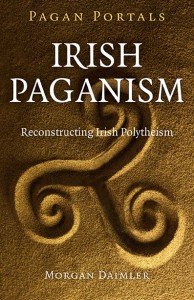
The Celtic Myth Podshow, run by Gary and Ruth, is a very popular production. They describe themselves as follows - "The Celtic Myth Podshow will tell you ancient tales and legends of Ireland, Scotland, Wales, Cornwall, Brittany and the Isle of Man bringing you the bravery of heroes and heroines, the magnificent pantheon of gods and goddesses and the magic and wonder of druids, faeries and folklore."
The link will take you to the indepth review they've done of Morgan Daimler's Irish Paganism.

An impressive array of Pagan voices

13 authors, leading names in Paganism and academia, reflect on the relationship we experience between landscape, ancestry and our sense of self. it's a book with remarkable breadth and depth, and a lot to challenge and inspire a reader.
I was asked to read the book way ahead of publication, and to comment on it - truly, it's an honour to be asked to give my small voice in support of some of the best, and best known names in modern Druidry. This is what I said at the time:
"Most Pagans look to the past for inspiration. How we relate to our ancestors, who we even understand them to be, and what we carry, real or imagined, into the future is often a key question for modern Pagans. This book offers an intriguing array of insights, ideas, challenges and possibilities that help the reader consider their own relationship with issues of ancestry, identity and belonging."
It's a fine book, I heartily recommend it. I think I was asked to comment because I have a Druid title of my own about ancestry and how we relate to it, and its a happy accident that this has taken me into a lot of thinking about the relationship between land and ancestry, too. It's fascinating to see other authors exploring this territory - both physical and spiritual - and I think there are issues here that could be, perhaps should be at the very heart of how we think about Pagan spirituality.

An old review and a new review

Living with Honour is a courageous attempt to deliver something that has not been offered by a pagan author before - a realistic and thoroughly honest evaluation of the path she has made her own. Potential readers will be sent on a breathtaking journey into the oft misunderstood world(s) of paganism and what it actually means to take that world seriously: to live in it, celebrate it, dance with it, argue with it, and allow its charms as well infuriations to mould one's life. This book will help any reader not just to understand paganism at a deeper level, but also to make meaning out of life on this beautiful, yet messy and painful planet. The author leaves no stone un-turned and, while seeing all such stones as strangely sacred, does not shirk at offering necessary criticisms as well as hearty praise. Finally, as with all of Bobcat's books, this volume is written with poetry and warm humanity that makes it sumptuous and quite uncommon for the world of theoretical non-fiction. ~ Mark Townsend, priest, magician and author of The Wizard's Gift, The Magician's Tale and other titles
Living with Honour was published in 2008, and at the time of publishing, Mark Townsend's review, as quoted above, was very much a representation of where this book fitted into then-contemporary Pagan writing. Since then, a lot of other writers have been inspired to start talking about Paganism as a lived path. Emma Restall Orr's work has, no doubt, contributed to this flourishing of subsequent Pagan writing, showing that it made sense to replace dogma and how-to approaches with experiential, person and reflective writing that leaves the reader with plenty of room for whatever differences there are between the wiring and their own lived experiences.
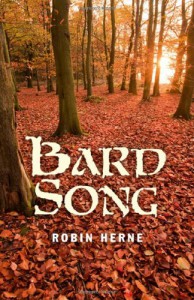

 1
1
 1
1













